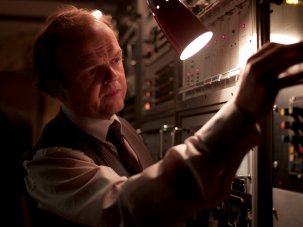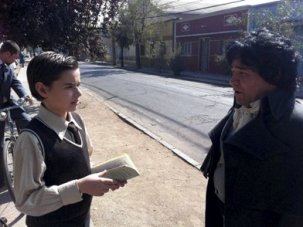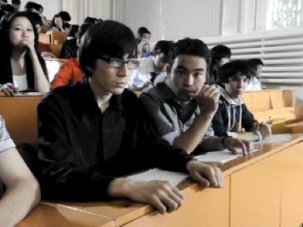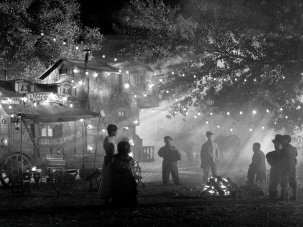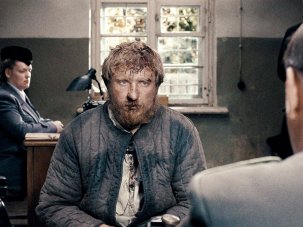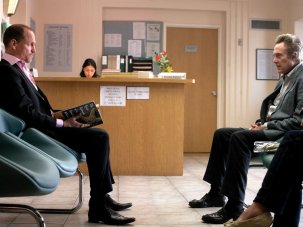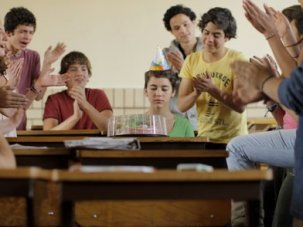Full web edition
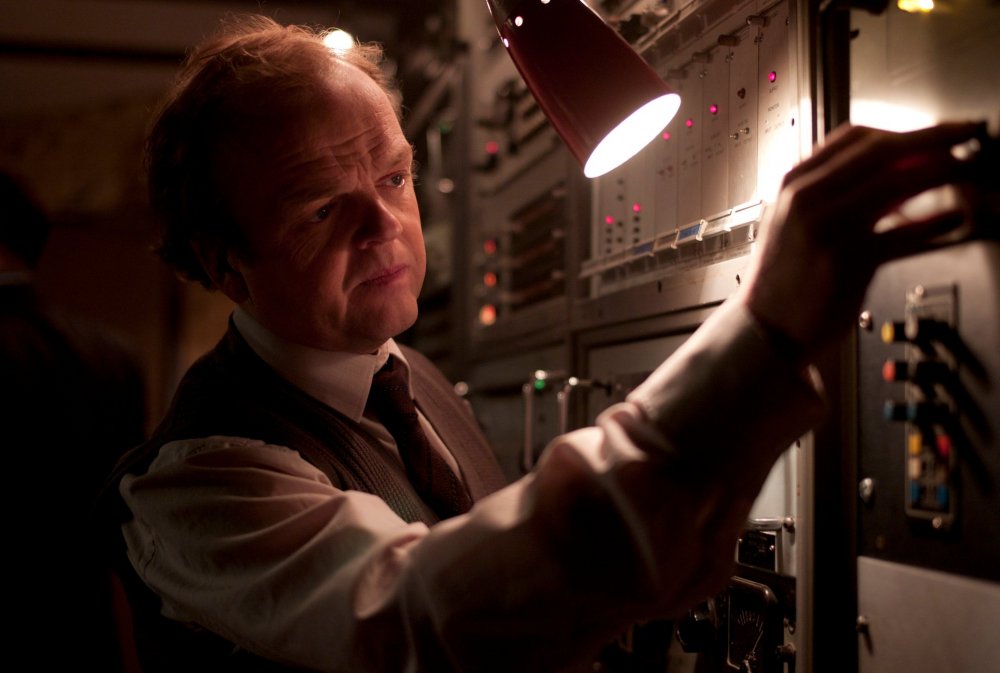
Berberian Sound Studios
Andrea Picard
Critic & curator, Toronto International Film Festival, Canada
differently, Molussia (anders, Mollusien)
Nicolas Rey, France
Flouting the use of the word ‘occupy’ and instead invoking the underappreciated theories and prose of Günther Anders, Rey has made the year’s most timely, acute and chilling film — one with 362,880 permutations, one each for all the ways in which the world is sick and in need of gross improvement.
Tabu
Miguel Gomes
Feverish forbidden love and aching desire at its most poignant and pregnant in a dreamy diptych of paradises lost and found. Tabu strays into the indecencies of Portuguese colonial history by way of Murnau, Flaherty and Gomes’s signature ‘melan-comic’ surrealism.
Leviathan
Lucien Castaing-Taylor & Véréna Paravel, France/UK/USA
Sensory ethnography or Vertovian heavy metal on the high seas, Leviathan ushers in a host of complex ontological questions about cinema’s contemporary state via total immersion into fishing, an activity that dates to the Palaeolithic and retains to this day its primeval brutality.
Viola
Matias Piñeiro, Argentina
A virtuosic cinematic roundelay cum incantatory Shakespeare mash-up with sexy young things from Buenos Aires, Viola is loquacious, sexy and casually cerebral as it spins a dizzying web of desire and dramaturgy.
La noche de enfrente
Raúl Ruiz
The Student
Darezhan Omirbaev, Kazakhstan
Beautifully old-fashioned, beguilingly stilted and replete with cinephilic clin d’oeils, Ruiz’s swansong La noche de enfrente and Omirbaev’s Bresson-soaked Student revel and bask in the light of influence. The former is a sprightly summa and farewell, the latter a stinging social allegory, both suitably stylised to the filmmakers’ own sensibilities with a decidedly literary bent, looking backwards and forwards at once.
Highlight/lowlight
While Leos Carax’s hotly anticipated, shape-shifting Holy Motors proved a high point of return, the year’s most notable event was ultimately one of disappearance. The loss of Chris Marker is immeasurable to all those who love cinema and spend a great deal of their time creating, admiring, interpreting, writing and talking about images – ones that move, are static and are forever lodged in our memory, be they real, imagined, desired or planted by a futuristic feline.
Vic Pratt
BFI Archive, UK
Reality
Matteo Garrone, Italy/France
Exuberant Aniello Arena is outstanding in this parable for our times as a fish seller and would-be Big Brother contestant who, convinced that he belongs on the show, torments his family and drives himself to the brink of madness.
Dark Horse
Todd Solondz, USA
Solondz delves into the bleakest corners of family life with this achingly lonely tale of a thirtysomething Doctor Who fan and his desperate search for love. It may or may not be a comedy.
Dredd
Pete Travis
With a million times more zarjaz than the feeble Stallone version, here at last is a Judge Dredd that readers of his comic-strip exploits in 2000AD will recognise and appreciate. And Karl Urban’s square-jawed future cop doesn’t take his helmet off once.
Searching for Sugar Man
Malik Bendjelloul
This slick documentary will warm the hearts of unheralded singer-songwriters everywhere. Watch and wonder just how it is that talented troubadour Rodriguez can be forgotten in America yet hailed as a genius in South Africa.
Skyfall
Sam Mendes, USA/UK
After slumping somewhat with Quantum of Solace, the Bond franchise returns to form. Javier Bardem is suitably creepy as a villain of whom Ian Fleming might approve, and for the most part Skyfall gets it right – at least until Bond gets a backstory and a Scottish castle.
Highlight
Meeting the wonderful Sara Karloff, daughter of the legendary Boris, and finally getting to ask her: “So, were Bela Lugosi and Boris Karloff really rivals?”
James Quandt
Critic, USA
La noche de enfrente
Raúl Ruiz, Chile/France
Plus Ruiz’s rediscovered 1963 short La maleta. Life seems untenable without more films to anticipate from him!
The Last Time I Saw Macao
João Pedro Rodrigues & João Rui Guerra da Mata
In Another Country (Dareun Narayeseo)
Hong Sangsoo, South Korea
No
Pablo Larraín
Perret in France and Algeria (Perret in Frankreich und Algerien)
Heinz Emigholz, Germany
Naman Ramachandran
Critic, India/UK
Blancanieves
Pablo Berger, Spain
A terrific new silent version of Snow White that puts in the shade the two other takes on that fairytale released this year, avoids the maudlin excesses of The Artist and pays homage to German expressionism without, thankfully, going the full Guy Maddin.
Skyfall
Sam Mendes, USA/UK
Humanises Bond even more and makes him a vulnerable figure that mass audiences can relate to.
Miss Lovely
Ashim Ahluwalia, India
Wonderfully crafted tale of sibling feud set in the lurid world of 1980s Bombay schlock/horror/porn filmmaking, enriched by its meticulous production design.
Seven Psychopaths
Martin McDonagh, UK/USA
McDonagh manages to out-Tarantino Quentin, and in the process delivers the most belly laughs of the year with a clever script that’s an equal-opportunities offender.
My Brother the Devil
Sally El Hosaini
Hosaini’s bravura debut provides a fascinating window into the little-seen world of British Egyptians and masterfully explores teen gang culture, complete with the authentic argot.
Highlight
During the course of writing his biography I met India’s biggest superstar Rajinikanth, an actor with near-divine status among his fanatical cult following who has spawned more than 50,000 fanclubs across the world and is an internet meme. I was delighted to discover that he remains a simple, humble person without a trace of ego – unlike many of his compatriots.
Nicolas Rapold
Film Comment, USA
Almayer’s Folly
Chantal Akerman
Cosmopolis
David Cronenberg
Leviathan
Lucien Castaing-Taylor & Véréna Paravel
The Master
Paul Thomas Anderson
Silver Linings Playbook
David O. Russell, USA
Repertory highlights
Jennifer Dworkin’s Love and Diane & Ed Pincus’s Diaries (1971-76) & William Wellman & celebrating Fassbinder’s 30th deathaversary & Frank Oz’s What About Bob?.
Tony Rayns
Critic, UK
Emperor Visits the Hell
Li Luo, China
The Morning of St Anthony’s Day
Joao Pedro Rodrigues, Portugal
Noodle Fish
Kim Jinman, South Korea
Walker (episode in BEAUTIFUL 2012)
Tsai Mingliang, Hong Kong
White Night
LeeSong Heeil, South Korea
If I could have a sixth choice, it would be another Korean short: Yun Kinam’s The Metamorphosis. Three of the above are also short films, which reflects a general sense that this was not a great year for new features, despite promising debuts by several young directors from the indie sector. Reasons for cinéphile optimism (I’m quoting the subtitle of David Bordwell & Kristin Thompson’s invariably interesting blog) were almost all in the area of archival discoveries.
Best of the lot was Kinugasa Teinosuke’s 1932 talkie version of The Loyal 47 Ronin (Chushingura), full of witty/anarchic inventions which look back to the Kinugasa of A Page of Madness (1926) rather than forward to the stodgy academic director he turned into. That was seen at the Cinema Ritrovato festival in Bologna, where other highlights included a group of wild Raoul Walsh talkies from the early 1930s. Much talk everywhere of “the death of cinephilia” and plenty of evidence that the present-day young audience has much less interest in the medium as such and much less curiosity about its history than the previous generation did.
Kong Rithdee
The Bangkok Post, Thailand
Tabu
Miguel Gomes
The memory of cinema and of storytelling, of vanished glory and doomed romance, reclaimed and retold in this beautiful narcotic of a movie.
Holy Motors
Leos Carax, France/Germany
Born from the womb of cinephilic history, raised into a many-headed beast, dangerous and passionate, it shows how cinema can recall its past and augur its future lives.
Margaret
Kenneth Lonergan, US
The Upper West Side as the wilderness of conflicting emotions; one of the most frightening character portraits.
Ashes
Apichatpong Weerasethakul, Thailand
The toy camera slices up time and reassembles fragments of trips, talk, memories, dreams. The colours are infernal. Then it ends, as it should, with a funeral firework.
Spring Breakers
Harmony Korine, USA
Mad, lush, sweaty, naive, stupid, hellish, irresistible.
Highlight
For the second year, the Thai Film Archive registers 25 films as National Cinematographic Heritage. The list includes newsreels, documentary films and features, mostly old but some fairly recent. In all, they sketch the journey of the Thai movie industry and history of the past 85 years, and represent an ongoing effort in preserving, restoring and promoting the cinematic treasure that has been long neglected.
Vadim Rizov
Critic, USA
The Master
Paul Thomas Anderson, US
A comedy of male bad behaviour beautifully disguised as a worthy white elephant. The rudest 70mm epic ever made.
Cosmopolis
David Cronenberg, Canada/France/Portugal/Italy
As a global non-city falls apart, capitalism (via Metric) sings ‘Haven’t got long to live’.
Tabu
Miguel Gomes
Cinephilic post-colonial agitprop on the lasting importance of left-for-dead cinematic idioms and far-from-over class/racial tensions.
Abendland
Nikolaus Geyrhalter, Austria
Europe by night in geographically wide, thematically focused cross-section.
Magic Mike
Steven Soderbergh
As much summer fun as a portrait of American near-bottom-of-the-ladder economic powerlessness could be.
Highlights
I’m continually obsessing over the death of celluloid — or, perhaps more accurately, the remarkably poorly handled transition to digital, having just returned from a screening of Lincoln which seemed to be sped up, like a TV improperly configured. Perhaps I’m overrating The Master (a second viewing is definitely in order), but its 70mm release in New York City was a heartening Event – a visual spectacle the like of which hasn’t been seen in new release in some time.
Tim Robey
The Daily Telegraph, UK
Tabu
Miguel Gomes
Hailed sight-unseen before Berlin as a rapturous masterwork, this actually turned out to be one, but it was also the wittiest, saddest and most playful film of 2012.
Beasts of the Southern Wild
Benh Zeitlin, USA
A movie whose fervent energy and DIY innovation need to be valorised. A forward-thinking and snark-free zone – unlike its grumpier reviews.
Nostalgia for the Light (Nostalgie de la lumière)
Patricio Guzmán, France/Germany/Chile/USA
I was sceptical about whether the stargazing and suffering would mesh in any sensible way, but Guzmán’s compassion defeated all doubt. A humbling reverie.
War Witch (Rebelle)
Kim Nguyen, Canada
Fear in the jungle, bullets in the sky, love in a hopeless place. Stands rightfully alongside Johnny Mad Dog, crackling with tendresse and horror.
Beauty (Skoonheid)
Oliver Hermanus, South Africa/France/Germany
From the unnerving first shot, here’s a director completely in charge of his voyeuristic medium, plus one of the year’s unshakeable performances from Deon Lotz.
Highlight
Exploring the Paris rep circuit, Pariscope in hand, I lucked in with an afternoon viewing of André De Toth’s magnificent Day of the Outlaw (1959), which threw me for a loop. Russell Harlan’s bracingly wintry Oregon photography. Tremendous score by Alexander Courage. Robert Ryan, in surely his most complex performance, and Burl Ives – both start out seeming like villains. The Saturday-night forced-dance sequence where all the women in town submit to being groped. Questions of what civilisation and morality mean. And a killer climax. It’s an absolute gold-star western, as good as Boetticher’s very best. Park Circus should give it a UK airing, if at all possible.
Nick Roddick
Critic, UK
After Lucia
Michel Franco
Franco’s second film is fresh, brutal and formally stunning, especially impressive for the way in which a story based on a real case of school bullying has been distilled into a precise and rigorously structured work of art.
Beyond the Hills
Cristian Mungiu
If 4 Months… revealed Mungiu’s narrative skills, this confirms him as a modern master, combining a strong directorial style with first-class work with his actors, and ending on a shot that goes straight into my pantheon of transcendent moments in cinema.
Barbara
Christian Petzold, Germany
I’ve long been a fan of Petzold, but this is the most hallucinatory example yet of his ability to conjure up a sense of almost supernatural menace while telling an apparently ‘real’ story of everyday oppression in the GDR.
Holy Motors
Leos Carax, France/Germany
It took me two gos to ‘get’ Carax’s gleeful celebration of cinema, Paris, actors and whatever else anyone finds in the film. But the second visit was well worth the train fare.
Everybody in Our Family (Toata Lumea din Familia Nostra)
Radu Jude, Romania/Netherlands
The year’s real wild card: Jude’s account of a separated father’s disastrous attempt to spend a day out with his young daughter decisively demonstrates that farce is the flipside of tragedy.
Highlight
Seeing Sam Peckinpah’s Pat Garrett & Billy the Kid introduced by the director’s daughter Lupita at a screening in Morelia, Mexico. All right, the print wasn’t great, but Peckinpah’s final western distils all his themes – the end of an era, loyalty, the bond between friends made enemies by circumstance – into one magnificent forward movement. The title characters are driven to their deaths – as in classical tragedy – by fate and hubris, carried along by a wonderfully laconic script by Rudy Wurlitzer. It’s a film that really needs a big screen, as much for Peckinpah’s use of landscape as for the blazing red of the western font (Barrelhouse?) used in the credits. 122 minutes of bliss, many of them spent rubbing away the tears. Thank you, Morelia.
Jonathan Romney
The Independent on Sunday, UK
Amour
Michael Haneke
This film went further than any in recent memory in tackling the human condition. Haneke lifts the cinematic taboo on the truth there’s no getting around: we get old, we die, our bodies fall apart, and love and culture may bring us less comfort than we like to think. Emmanuelle Riva in particular gives a performance of exceptional brilliance and courage.
Tabu
Miguel Gomes
One of the few genuine UFOs of the year, a deliciously characterful and original film steeped in tenderness, historic regret and a peculiarly postmodern strain of saudade. I also, of course, loved this film for the anachronistic Ramones-play-Phil-Spector lip-synching, and for cinema’s animal of the year 2012 – the “sad and melancholy crocodile”.
The Master
Paul Thomas Anderson, US
Berberian Sound Studio
Peter Strickland, UK
In the Fog
Sergei Loznitsa
Loznitsa’s war film is a superbly constructed anecdote, at once simple and troublingly complex. One of the films I most want to see again in 2013.
Highlights
Guy Maddin’s ‘Seances Project’, which I visited while he was installed at Paris’s Pompidou Centre. Part of a long-running project to film legendary lost or unrealised scripts, this bizarre, quixotic enterprise could only have been conceived by Maddin, and I was thrilled to see him in action halfway through his one-film-a-day marathon – channelling a 1923 Mizoguchi melodrama, while Udo Kier and the cast grappled with mouthfuls of ectoplasm.
Most overlooked film: Alain Gomis’s Tey (Aujourd’hui), an existential miniature from Senegal. When I say ‘miniature’, I’m thinking about the film’s concision and grace, but Tey’s scope is an entire life, squeezed into the allegorical day of a hero who knows he’s fated to die. Tey is as much dance as film, both because of the camera’s sinuous mobility and because of the eloquent physicality and easy wit of Gomis’s lead Saul Williams.
Jonathan Rosenbaum
Critic, US
Unless one has enough time to do a proper survey of the films one’s seen during a given year – and I don’t – lists of this kind tend to favour recent discoveries. With the exception of the second and third items in this alphabetical line-up, these are autumn revelations:
Far from Afghanistan
John Gianvito, Jon Jost, Minda Martin, Soon-Mi Yoo & Travis Wilkerson, USA
Gianvito – assisted here by Andre Gregory and others – offers one of his modest yet irreplaceable lessons in human decency, with plenty of thoughtful scruples about how to phrase as well as apply them.
Jerry and Me
Mehrnaz Saeed-Vafa, USA
A 38-minute autobiographical essay about growing up in Iran and then adjusting to American life – largely couched in the form of clips from Jerry Lewis films, Rio Bravo, Imitation of Life and Psycho, dubbed into Farsi – is another invaluable crosscultural lesson.
Margaret
Kenneth Lonergan, USA
Even though Lonergan’s two-and-a-half-hour urban masterpiece surfaced in the US late last year – to not nearly enough mainstream attention – it is only beginning to be discovered in Europe. (There’s also a three-hour version, equally approved by the writer-director, available now on DVD.) You might call this a vast 19th-century novel, with over a dozen important characters (beautifully performed by a superb cast) and an acute sense of the Manhattan zeitgeist circa 2003.
The Last Time I Saw Macao
João Pedro Rodrigues & João Rui Guerra da Mata
Not only do Rodrigues and da Mata do for Macao (and Macao) what Chris Marker did for Vertigo and San Francisco – they also work wonders with dogs, docks and an ongoing poetry of absence.
Tectonics
Peter Bo Rappmund, USA/Mexico
This epic traversal of the Mexican-American border recalls some of the formal poetry of both James Benning and Chantal Akerman while forging a provocative politics of its own, based on notions and instruments of surveillance.





